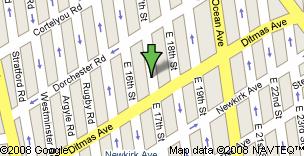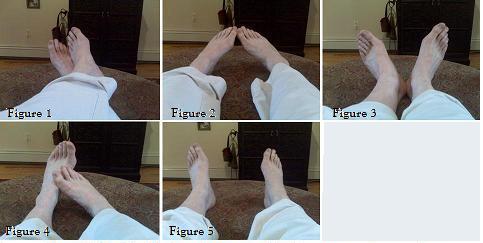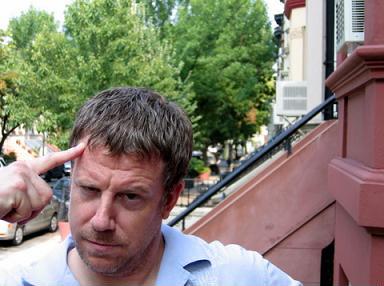Archive
The Secret
Fig 1-5, An unidentified broker documents his time at a recent open house.
Pssssst. Hey you. Yeah you: Mr. Buyer. Want to know a secret? Come over here. A little closer. Closer. Clooooser. Now listen carefully. We are not very busy. No- scratch that, we are not busy at all…OK, it’s dead out here. August is always dead. Really dead. Our open houses are poorly attended. Our blackberries aren’t buzzing. Our sales figures are down. Our sellers are not happy, so we are not happy. Our sellers are worried. We are worried. Our sellers want to make a deal. We want to make a deal.
Are you still listening? This is an opportunity for you. Here’s a suggestion: this year, why don’t you and your brethren close up the beach house early and, instead go shopping for a real estate bargain?
Here’s another secret: about two weeks after Labor Day, everything changes. Things pick-up, office phones ring, websites get hits. More of you go to our open houses. More of you make offers. And more of you actually purchase a home. How do I know? Just like August is always slow, September is always better.
So make a deal while you can – the Brooklyn Real Estate Sale ends September 14th!
E. 17th Street
 Yesterday, I arrived early for an appointment and so decided to take a stroll down E. 17th Street. This neighborhood was once known as Flatbush and is now called Ditmas Park. It was such a nice walk that I had to share it with all of you. This block is full of detached Victorian style homes, all in pristine condition and most with front porches. The sidewalks are pleasantly lined with oak, maple, and various fruit trees. I understand that many of you are familiar with this area, but believe me, even by Ditmas standards, this block is something special.
Yesterday, I arrived early for an appointment and so decided to take a stroll down E. 17th Street. This neighborhood was once known as Flatbush and is now called Ditmas Park. It was such a nice walk that I had to share it with all of you. This block is full of detached Victorian style homes, all in pristine condition and most with front porches. The sidewalks are pleasantly lined with oak, maple, and various fruit trees. I understand that many of you are familiar with this area, but believe me, even by Ditmas standards, this block is something special.
When you have a moment and before the summer is over, please take in E. 17th Street, between Newkirk and Dorchester…and if you have another moment, let me know how it went. Thanks for reading.
What Happens Now?
Often after someone has either made or accepted an offer, I’m asked, “what happens now?” Below is a chronological list of how things should proceed after an Accepted Offer.
- Pick an attorney. It’s pretty tough, in New York, to complete a real estate transaction without an attorney. It is also pretty tough to get on their calendar. So, I highly recommend that you do this before you put your home on the market or before you start shopping for a new one. A good lawyer is your advocate throughout the transaction and if you are a buyer, often the only person who has your best interests in mind. I personally would not buy or sell real estate without one and you shouldn’t either. Rules for picking a lawyer are the same as they are for picking any professional: get a recommendation if you can and pick someone you trust and feel comfortable with.
- Start the attorneys communicating. The person on the other side of this transaction will have an attorney as well (if they don’t, good luck getting into contract). You’ll want to insure that both attorney’s have each others contact information. What good agents and brokers usually do is give each attorney a one page Deal Sheet. The Deal Sheet contains the contact information for the buyer, the seller, their attorneys, the sales price and the escrow down payment (this is usually 10% of the purchase price and is different from your down payment for financing). If you are not working with a broker, then just put you’re your own deal sheet together. You should send the deal sheet to each lawyer within a day of the accepted offer. A well organized Deal Sheet will save a busy lawyer time and get you to contract sooner rather than later.
- Seller’s attorney will send out a contract to the buyer’s attorney. The attorneys will probably negotiate a bit on some of the details, but they usually come up with a document that they will let their clients sign. You really want to make this happen within two weeks -before the person on the other side of this transaction changes their mind.
- Sign the contract. You will meet with your attorney who will advise you about the specifics of the contract. You should ask any questions you have here and if all goes well you’ll sign the contract. If you are the buyer you will also write out a check -usually 10% of the purchase price- which will be deposited in an escrow account.
- Choose a mortgage broker or bank (buyers only). Like picking an attorney, this is something I recommend you do before you even start shopping for a place. Most lending institutions will issue you a pre-qualify letter which will state that you are capable of borrowing up to X amount of dollars. This is a good way to prove to a seller or broker that you and your offer should be taken seriously.
- Appraise the Property. When you boil it all down, banks only judge a transaction by two criteria. Will the buyer pay back the loan? And is the property worth enough to justify the loan? To determine the latter, the bank or mortgage broker will hire a licensed appraiser to estimate the value of the property.
- Bank issues a commitment letter. After the bank has done its due diligence on the buyer and the property, it will issue a commitment letter. This is the letter that says the buyer is approved for the mortgage. It states the interest rate, amount, and term of the loan (among other things). Once this letter is received you can schedule the closing.
- Schedule the date of the closing. The seller, the buyer, their attorneys, the bank’s attorney, and a title insurer, will all break out their date books and figure out the best day to finalize the transaction (be patient, this can be harder than seating your relatives at a wedding).
- Close. This is where the rest of the money exchanges hands and the buyer gets the keys. Essentially this is how the money will be distributed:
- a) The seller’s attorney will write a check to the seller from her escrow account. This will be equal to the check the buyer wrote when he signed the contract.
- b) The buyer’s bank will write a check to the seller for the amount that the buyer is borrowing from the bank. (That’s right; the buyer never gets his hands on the money.)
- c) If after steps a) and b), there is money still due to the seller, the buyer will write a check for this amount.In addition to all of this, with your attorney’s help, you will sign half a ton of documents(buyers, you will actually sign a ton and a half). Once you are done you can …
- …Move! In or out, depending on who you are. And you can almost always do this immediately after you close.
Feel free to forward any questions my way. Thanks for reading, Jim.
Take Five
The author demonstrates the Take Five method
People often solicit my opinion about a given neighborhood. “Is it safe?”,they ask. “How is the area? What are the locals like?”, etcetera, etcetera,… I flat out try to evade these questions and I have my reasons. For one, I’m very fond of the neighborhoods I work in and don’t feel capable of answering objectively (It would be like bad-mouthing a family member to an outsider). For two, other than the number of times I’ve been fleeced by the Department of Finance (see How to Park It), I don’t worry all that much about crime in my neck of the woods. And three, the locals question? I don’t even want to know what people are getting at there. So I don’t answer any of these questions. But this is what I do say. I say, “because everyone has a different comfort level when it comes to these things, you need to explore the neighborhood yourself. That means more than just a cursory look. You need to take five extra minutes with some of the residents and get to know them. Doesn’t matter how you do it, but you need to engage a few locals. Ask for directions or the best place to get coffee. Say good morning or good afternoon. Whatever it is, just talk to people. If you do this, I guarantee, that if you really do this, you will see the neighborhood and you will see the entire city of NY in a very different light.”
I can hear the collective moan coming over the big T1 line in the blogosphere. You are out of your mind Jim. This is New York City! You can’t just talk to people on the street. You’ll scare them, or they’ll be suspicious, or they’ll get mad. My experience has taught me otherwise. When I first started exploring Crown Heights, I would stop random people on the street and ask them what they were paying for rent. If anyone asked why, I would simply say that I was thinking of buying a three family building in the neighborhood and wanted to know what I could lease the apartments for. And you know what? People talked to me. They were friendly. They were nice. They were very helpful. I even got invited into someone’s apartment to have a look. I couldn’t believe it either, but I learned a valuable lesson about my city. Nowadays, I almost always say hello, good morning, and good afternoon and my neighbors usually say it back.
So you want to know about a neighborhood? Take five extra minutes and get to know its residents. Thanks for reading, Jim.
Lawyer Up
 (Let it be known that I type this post, whilst an 11 lb baby boy sleeps in a sling around my neck).
(Let it be known that I type this post, whilst an 11 lb baby boy sleeps in a sling around my neck).
In my line of work, there is plenty of ambiguity. I’m often not sure how to get the best return for my limited time; or if I should spend money on hiring an Admin, or an SEO consultant; or if someone is telling me the truth; or, my least favorite, if a particular agent says he is working for the buyer or the seller is he really? This last one frequently bites people-especially inexperienced buyers-in the derriere. Why is that? Real estate transactions and residential real estate in particular, are often negotiated through third parties. In these instances, you want to unambiguously trust the person you’ve hired.
I’m sure you’ve all walked into an open house and had the agent, i.e. the seller’s agent; tell you that the owner was flexible or would take much less than the asking price. Say what? That agent, in theory, is working on behalf of the seller, their client. So why are they lowering the asking price behind the seller’s back? Furthermore, I’ve had “buyer’s brokers”[1] come to my open houses and tell me things like, my client will offer X, but I think that she can go as high as Y. Well thank you for that information, Sir or Madam. Now I’m going to go right back to my client and tell him to counter your client with Y+Z.
Granted, these examples don’t typify all agent/brokers, but they do represent some. One problem is the business is very loosely regulated and the requirements are slim (in New York State, it’s just as difficult to be licensed as a cosmetologists, not that I’m knocking cosmetologists).
My point, after all of this, is that you need to hire a real estate attorney before you enter into a transaction. They are highly educated, they work only for you, and they eat, sleep, and breathe the attorney-client privilege thing. Whatever you say to them is between you and them. Everything they do is for the benefit of you, the client. Nice huh?
Here are just some of the services they’ll provide:
- Draw up and negotiate a contract of sale;
- Order and Review Title Insurance;
- Review all bank documents;
- Review a co-op’s or condo’s offer plan, financial statements, and meeting minutes;
- Attend the closing;
And if that’s not enough, they’ll answer all of your questions honestly, and have nothing at all to sell you. Their only focus is completing the transaction for you. They also provide a fresh, impartial set of eyes on your deal – which is particularly helpful to first-time buyers and buyers who are, themselves, lawyers (yes, you lawyers should hire lawyers too).
That’s all for now. Thanks for reading, Jim.
[1] For more on so-called “buyers brokers” read I work for you (but I don’t work for you)
I’ve been away
Hi. I have neglected this site for some time now. At the risk of sounding a bit sentimental I want to say I have a good excuse. My wife Julia and I had a son and we couldn’t be happier.

 Nathan J.P. Winters (aka Nathan Detroit) was born Dec. 18th 2007. He’s fantastic, we are all doing great, and every good thing you’ve ever heard about being a new parent is true.
Nathan J.P. Winters (aka Nathan Detroit) was born Dec. 18th 2007. He’s fantastic, we are all doing great, and every good thing you’ve ever heard about being a new parent is true.
…and now back to work.
Brooklyn- My Home
Coops, condos, coops, condos, a house
A one family, a two family, a penthouse
A ranch, a Victorian, an old brownstone
All I wish for, is an abode of my very own
A five hundred plus foot square by square
A cozy little den with a big comfy armchair
A fistful of blue sky and a patch of leafy green
All will give life to my dreams n a lovely sheen
Prospect Park West, Park Slope and Kensington
Windsor Terrace and Carroll Gardens, all beckon
Cobble Hill, Boerum Hill, Sunset Park, Clinton Hill,
All these hoods are quite savory and give me a thrill
New York, city of dreams, five suburbs, a wonderful skyline
Manhattan, Queens, Staten Island and Long Island are fine
But my heart is set on one, only one corner and that beckons
Of all the five boros that make New York, and that is Brooklyn!
Prospect Park, Public Library, Museum, Botanical Gardens
Academy of Music, Grand Army Plaza, and lovely Fountains
Food Coop, shops, restaurants, churches, schools with griffin
All have a distinct flavor and I wish with all my heart to fit in
Coops, condos, coops, condos, a house I need
A fistful of blue sky, a patch of verdant green
An abode of my own is my wish that is quite ardent
And now I will achieve this through a competent agent!!!
“We shape our dwellings, and afterwards, our dwellings shape us”
Author: Winston churchill,, 1874- 1965, Bristish Statesman, Prime Minister
Bina Gupta is an Indian American poet. You can read more poems by Bina at http://www.binaguptapoetry.com/
Closing Costs 101
Lots of people tell me that they are surprised at the enormity of the closing costs involved in the sale or purchase of real estate. Astonished may be the right word, and incensed probably works even better. This is especially true for those people who have scraped and saved for years only to find out that they are still $10,0000, $20,000, $50,000 or more short when the closing costs are factored in. What are the closing costs for? Who gets the money? Why didn’t anyone warn me about this?
Closing costs are called closing costs because they are generally paid at the time of the closing. They fall into two categories. Those paid to a government entity, usually in the form of taxes, and those paid to the various professionals you hired at various stages of the transaction. These include your broker, your lawyer, the bank, the appraiser, the title closer, etc. That’s right, indirectly; you did hire a title closer.
The next several posts will explain and help you calculate your closing costs for several scenarios. Here’s how things will breakdown.
- Closing costs for a residential sale.
- Closing costs for a residential purchase.
- Closing costs for the purchase of a newly constructed condo.
Stayed tuned, all will be explained soon. Thanks for reading, Jim.
I work for you (but I don’t work for you)
Let’s get something straight – you and me. I work for you. I am contractually obligated and have a fiduciary responsibility to you. Just you. I promise to always have your best interest at heart. I am your agent and you are my client. This is even true if I don’t like you (rarely) or you don’t like me (occasionally). I take our relationship very seriously and I always explain it carefully so you will too. What you tell me in confidence always stays between us – you and me. If you tell me you will accept less than the asking price or that, for some reason, you need to sell your home immediately – that stays between us – you and me. Anything you tell me that would reveal your negotiating position is just between you and me. These things are never revealed to the other side – the other you – the you who I am about to address.
Now as for you. I don’t work for you. I work with you. You are not my client, you are my customer. We have no contractual agreement and my only obligation to you is to treat you fairly and honestly. I take this particular obligation very seriously, and always fulfill my end of the bargain. I usually like you, and we often get along swimmingly and you can trust me. However, none of that changes that I don’t work for you. So, please don’t ask me if the owner is negotiable, or what can you get this place for. Those questions are all going to get you the same answer. The answer is that I work for the seller, and I take that obligation very seriously, and because of that I’m not going to answer those questions. However, if you need to know if the seller is negotiable, or how much you can get a property for, then make an offer. I promise to present your offer to the owner promptly, and get back to you with his or her reply. And this, in no uncertain terms, will answer your question.
Me? I’m a broker. I work for you. That is, the you who is selling your home and you, who has signed a contract with me. My job is to get you the best price for your place -. the absolute best price that the market will bear. I take my job very seriously. On the other hand, I don’t work for you. You, who has a lot of agents telling you that you should only work with them, that only they can find you the perfect home, that they are your agent, that they are your broker, that they are your best friend. Me, I don’t understand how they can say this to you. They have never signed a contract with you, they know that New York State law says that they don’t work for you, and they know who they really work for. They know that we all work for the seller. But that’s just me, telling you and you, like it is. Thanks for reading.
Hi, my name is Jim, I Live in Park Slope, and I Own a Car
Three years ago, when my wife and I began dating, she would slog her brother’s pickup from Red Hook, where she lived, to Park Slope, where I lived, because her 100 pound Shepherd/Rotti mix was not permitted on the B61. Then, only two months into the relationship, long before I ever said, “I love you,” and while she was still a relatively poor law student, she bought the 1994 Honda Civic that we still have today. The car cost $2500. How she knew that I, at that stage of our relationship, a 43 year old confirmed bachelor, warranted such expenditure, is a testament to just how fantastic she is, how fortunate I am, and a post for another day. For today, the point is I own a car and I live in Park Slope.
(For those who don’t know, let me premise the following by saying that Park Slope and cars — or more specifically Park Slope and parking — go together as well as Rosie and The Donald. The neighborhood is nicknamed No-Park Slope. Google, Parking “Park Slope” and you’ll get no less than 284,000 hits.)
I use the car almost exclusively for work these days. My job entails a lot of driving and a lot of parking: metered parking, alternate side of the street parking, running into the office to get a set of apartment keys double parking, waiting in front of a fire hydrant to pick up the photographer parking, not knowing you left the car in front of a church or private school parking, coming back to your spot, finding your car missing, thinking it was stolen and finding out it was f$%#ing towed parking, amongst other categories of parking. Since the acquisition of the Honda, I have contributed inordinately to the city’s coffers – over $3,000 inordinately that is. And it is this fact that uniquely qualifies me to present you with the following revelations:
(Sadly, as I scribe this using Cafe Sutra‘s free WiFi, I have to run out to feed the meter…I’m back)
Parking Mantra: Be pessimistic.
Stop believing that life is fair, stop wishing things will work out, and stop hoping that maybe this time you won’t get a parking ticket. Face it – the city is on their game (I’m not happy about it, just stating the facts). Park illegally, give them the opportunity, and they will write you a ticket. My advice: prepare for the worst and have a plan. Read on.
The Tao of Parking: Take your time.
Relax, slow down and park the way God intended us to … legally. Give yourself a little extra time and you’ll be able to avoid parking where the city says you can’t. To demonstrate my point, the statisticians at From The Stoop, have carefully recorded empirical data over the last three years and have calculated the following:
- You have a 31% chance of getting a ticket within 10 minutes of an expired meter.
- The odds go up significantly after the 10 minute mark.
- You will receive a ticket more often for not moving your car during alternate side of the street parking then any other violation. (Think of it this way, if the DOT hired you to catch fish (i.e. parking violators), and you knew that in a specific cove (i.e. block), of a specific lake (i.e. neighborhood), at 11:01 AM every Tuesday, you could catch no less than 11 lunkers, wouldn’t you fish there every Tuesday at 11:01 AM and take the rest of the day off?)
- 23% of people will actually claim to observe the ticket being written and placed on their windshield.
- 43% of the 23% mentioned above will claim to have told off the ticket writer.
Point is, relax, drive safely, drive slowly, and park legally.
Parking tip #1: Save your quarters.
‘Nough said.
Parking tip #2: Employ the Double Time rule.
Sub-tip 1: Fill the meter for twice the amount of time you expect to be there. It’s a lot cheaper then the ticket. (25 cents per one-half hour as of this writing.)
Sub-tip 2: Always double the estimated time it takes to get to your car. Car parked 5 minutes away? Give yourself 10.
Parking Commandment: Thou Shalt Not Forget…
Again, from empirically gathered data, I know that the number one cause of expired meter and alternate side of the street parking tickets is a lost track of time. Solution: set an alarm. If you’re high-tech, set a reminder in your Palm or Blackberry. Want to go low-tech,? Get an egg timer. And, just as importantly, don’t wait to set it or put it off because…you’ll forget! Don’t make, or return, or answer a phone call. Don’t run into the office to get out of the rain. Don’t reach into your ashtray for a quarter. Don’t do any of these things before you set the alarm – because if you do, (remember empirical data) you won’t set it. Always set the alarm first and then do the other things.
There’s more I could write (including how to fight your tickets online), but this is already a long post. Please forward your own parking tips my way. I still need all the help I can get. Thanks for reading, Jim.


